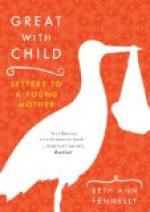No wonder so many girls, of the present day, make miserable housewives. No wonder a factory, a book-bindery, or a shoemaker’s shop, is considered preferable to the kitchen. No wonder the world degenerates, because females, no longer healthfully employed, become pale and sickly, spreading gloom and misery all around them, and transmitting the same ills which themselves suffer to those who come after them.
It is true, the guilt of this dereliction must not be charged wholly on mothers; though they ought, unquestionably, to bear a large share of it. Those who have, and ought to have, much influence in society, erroneously, and I suppose thoughtlessly, help mothers along in their evil ways. If there were a universal combination between certain classes of mankind and the whole race of mothers, to ruin, rather than be instrumental of reforming mankind, and of saving their deathless souls, I hardly know how they could invent a much better, or at least a much more certain plan, than that now in operation. So long as those who take the lead in society, and govern the fashion in this matter, as others govern it in the matter of dress, refuse, as a general rule, to form alliances for life, except with those who practically despise house-hold concerns—and so long as our houses are filled with domestics, whose object is to aid these spoiled mothers, but whose real effect is to complete their ruin, and accelerate the ruin of mankind—just so long will human progress towards perfection be retarded.
If mothers were in love with their occupations, and their daughters knew it, then to the influence of a good example they could add many lessons of instruction. These might be given in the way of natural, unstudied conversation, and thus be not only heard with attention, but sink deep. If the world is ever to be reformed, says Mr. Flint, in his Western Review, woman, sensible, enlightened, well educated and principled, must be the original mover in the great work. Every one who has considered well the extent and nature of female influence, will concur in the sentiment; and if he have one remaining particle of devotion to the Father of spirits, he will send up the most fervent petitions to his throne of mercy in behalf of this often depressed or enslaved half of the human race, that they may speedily be emancipated, and become as conspicuous in human redemption, as they have sometimes been in human condemnation.
CHAPTER XIX.
EDUCATION OF THE SENSES.
Improving the senses. Examples of improvement. SEC. 1. Hearing—how injured—how improved.—SEC. 2. Seeing—how injured.—SEC. 3. Tasting and smelling—how benumbed—how preserved.—SEC. 4. Feeling. The blind. Hints to parents. Education of both hands.
Man is much less useful and happy in this world than he would be, if more pains were taken by parents and teachers, as well as by himself, to cultivate his senses—hearing, seeing, feeling; tasting, and smelling—and to preserve their rectitude.




